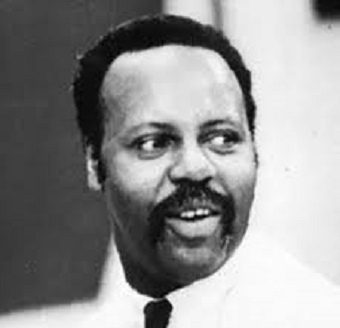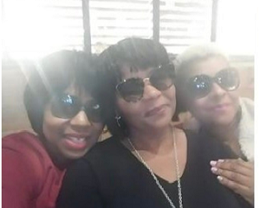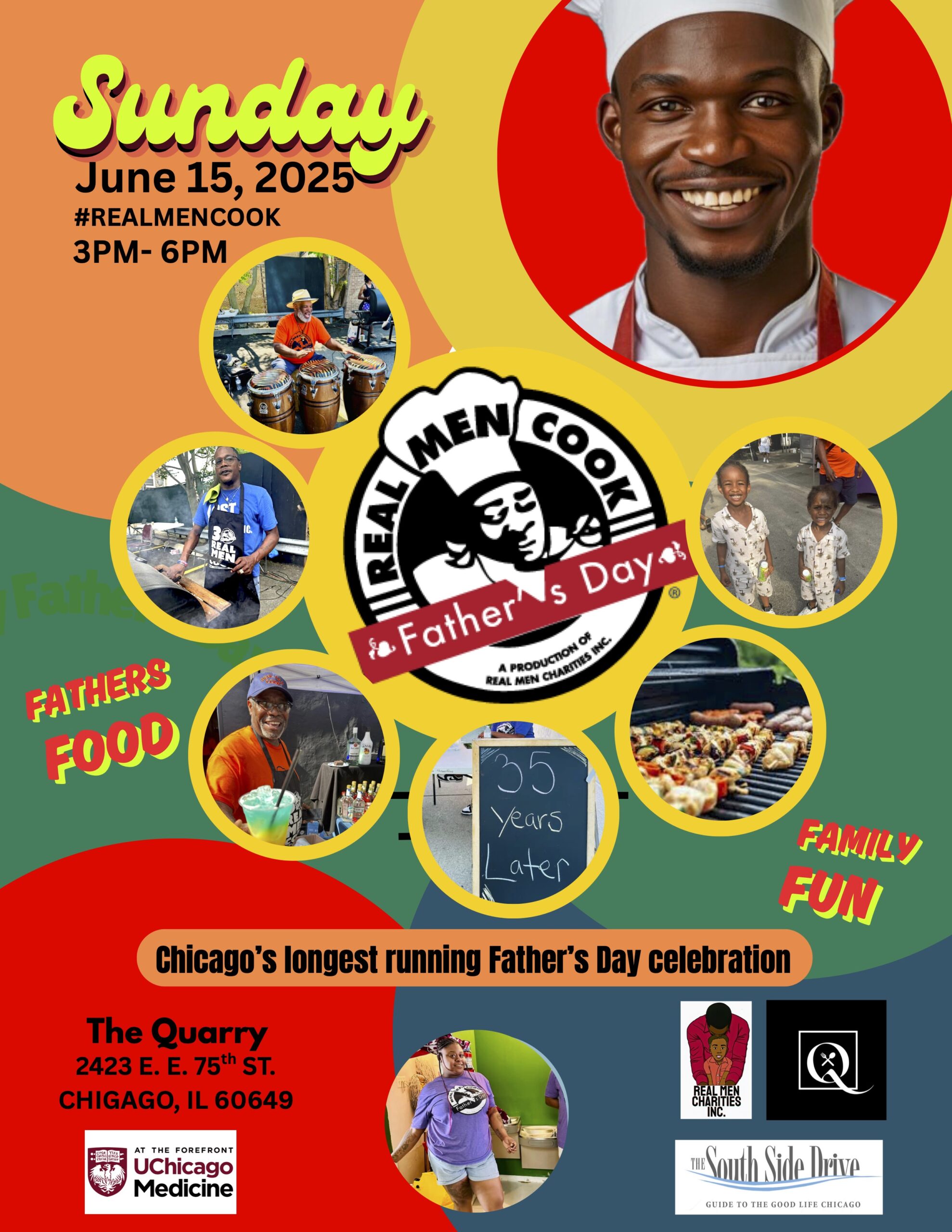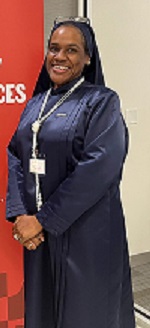If you think you’ve heard all the great south side music making stories, think again. Lifetime Chicagoan Charles Stepney was the writer, composer and producer of some of our most beloved music of the 60s and 70s. While choosing to remain in the background, Stepney composed music for some of the best-known groups and soloists that we came to know and love during that era. Among those he helped lift to stardom through his musical genius were groups like Earth, Wind and Fire, the Ramsey Lewis Trio, the Rotary Connection, the Emotions; and soloists including Minnie Riperton, Donny Hathaway, Denice Williams, Chaka Khan and many, many others.
There’s no telling how many other great musical contributions Stepney would have given the world, but like so many geniuses, he exited this life much too soon, at the age of 45.
Charles Stepney was more than a great musician, he was also a great father, and he left behind three wonderful daughters, Eibur Stepney Manuel, Charlene Stepney and Chante Stepney, to remind the world of their father’s musical genius and his many contributions to the world of music.

Being Charles Stepney’s daughters meant growing up in a music-centered home. “Daddy’s mother was a musician,” recalled Eibur Manuel, the oldest of the three daughters. “She played piano for the church, and she taught my father how to play.” His mother, Minnie Stepney, known to the family as Big Mama, had a gospel group called the Stepney Singers.
“There would always be music in the home,” recalled Charlene Stepney, the middle daughter. “Eibur sang more than me, but we all had to play an instrument, and Grandma would make us sing for the family when they came over for a holiday.”
Eibur recalled that most of the music that was echoed throughout their home came from the musicians who their father worked with. “They were always in the house singing and playing. There were the Emotions, Minnie (Riperton), the Rotary Connection, Donny Hathaway and key people like Shirley Walls, Kitty Haywood, and Cash McCall and so many more.”
As for musicians, “Ramsey Lewis was the musician that my dad was closest to, and spent a lot of time with,” said Eibur, “Daddy was Ramsey’s producer, arranger and writer, and I think Ramsey’s career helped catapult my father’s career.”
Chante Stepney the youngest Stepney daughter, was two years old when her father died.
“I don’t remember him, but his presence was always there,” Chante said. “I really treasure the way the whole family did such a great job of keeping me abreast of him through stories and anecdotes.”
“Even though he wasn’t there in human form,” Chante continued, “he was very much present throughout my childhood. I grew up with his Baby Grand Piano in the living room, and all of his gold albums and Clio Awards on the walls; his music was constantly playing, and his equipment was all around us, his essence and his spirit was always alive for me.”
Eibur adds, “Chante was a late baby, so when she was born my father told my mother, ‘this one is mine’ because by that time he had achieved enough success, so he had time every morning when he was home to get her up and feed her breakfast and play with her.”
Chante laughs, “Yeah, he wanted a son, and before I was born, they talked about the possibility of adopting. And so Mommy always says he wined and dined her and talked her into having another baby. I was the last-ditch effort for a boy.”
“Even though he did want a boy,” Charlene recalls, “he was perfectly happy loving the girls that he had. He was definitely a ‘girl Dad.’”
Eibur recalled how she had unrelenting faith in her father’s judgment of people. “I was the kind of kid that if my father didn’t like you, then I didn’t like you. Even if I wanted to like you, I’d just think, oh, it must be something terribly wrong with you if my father doesn’t like you.”
Their father made a studio in the basement of the two-flat building his family owned. “The basement studio was kind of famous,” Charlene remembered, “Everybody always talked about the red shag carpet.”
“People would ask us how he combined work and family,” Eibur said, “But in reality, there was no separation. He worked at home, and when he worked somewhere else, he would sometimes take us with him.”
Eibur said one of her father’s rules was “a place for everything and everything in its place,” and she remembers learning that lesson the hard way. “My idea of cleaning was throwing things under the bed, in the closet, stuffing them in the drawers,” she said, “So when my father discovered that was my idea of cleaning he was like ‘pull all that stuff out and put it in its place.” She laughs, “I was literally in tears, it took me all day, but I never had a dirty room ever again.”
Chante said when you talk to people who worked with him, they really loved him because he did the same kind of training in the studio. “They would tell us, ‘he taught me this,' or ‘he taught me that.’
Eibur agreed. “I think he really understood that his job was leadership and leadership was about training people and teaching people, and he was forever promoting critical thinking.”
“We always had access to him,” Charlene said. ‘He would make lunch for us, and when we attended the grammar school around the corner, he would drop us off or pick us up.”
Charlene recalls the time the Jackson Five were rehearsing at the Chess Studios.
“Daddy came to get me from school to take me to see them, but on a previous day, we almost got trampled at the Jackson Five concert, so I was scared, and I told him I didn’t want to go and meet them, and he was like ‘are you sure?’ I said ‘positive.’
I think he was like, ‘I’ve got the only kid who doesn’t want to meet the Jackson Five.’ ”
“He was a very good Dad,” Eibur said, “he was stern, but he was always loving.” “He played games,” Charlene said, “he loved to do magic tricks and he loved corny jokes. That was his favorite thing.”
Eibur laughed, “Charlene loved his corny jokes.” Charlene admitted that she did indeed love his corny jokes, “I try to emulate them as much as I can, in honor of his memory.”
“My father was a musical genius,” Eibur said, “But we didn’t always appreciate it.” Eibur recalls one time being in her room and hearing the song “Get Away.” “I knew that was Earth, Wind and Fire so I marched down the hall to my father’s room and I said, ‘I just heard “Get Away” and I don’t like it, why would you do that with all of those horns?’” Her father’s friends got a big kick out of that, and Eibur said, “They would come to the house and tease me, Ramsey used to say, ‘what do you think of those horns on ‘Get Away’? and he’d laugh when I said, ‘I don’t like them.’”
Charlene remembers when he asked her what she thought of the song, “Reasons” (performed by Earth, Wind and Fire). “I said I didn’t think it would make it.” She laughed. (“Reasons” went on to become a hit on the Billboard R&B Chart and has been covered by many artists including the Manhattans, Miki Howard, Maxi Priest, and others).
Many of the greatest songs of the late 60’s and early to mid-70’s were composed and arranged and produced by Charles Stepney. Songs like The Way of the World, Imagination and Reasons by Earth, Wind and Fire. LeFleur, sung by Minnie Ripperton, Soul Man by Rotary Connections, She’s Alright by Muddy Waters and many more – too many to name here. He was heralded as one of the greatest musical minds of the 60’s and 70’s.
Happy Heavenly Father’s Day, Charles Stepney. You left a legacy of great music and three lovely daughters to sing your praises and keep your spirit alive through your music.






